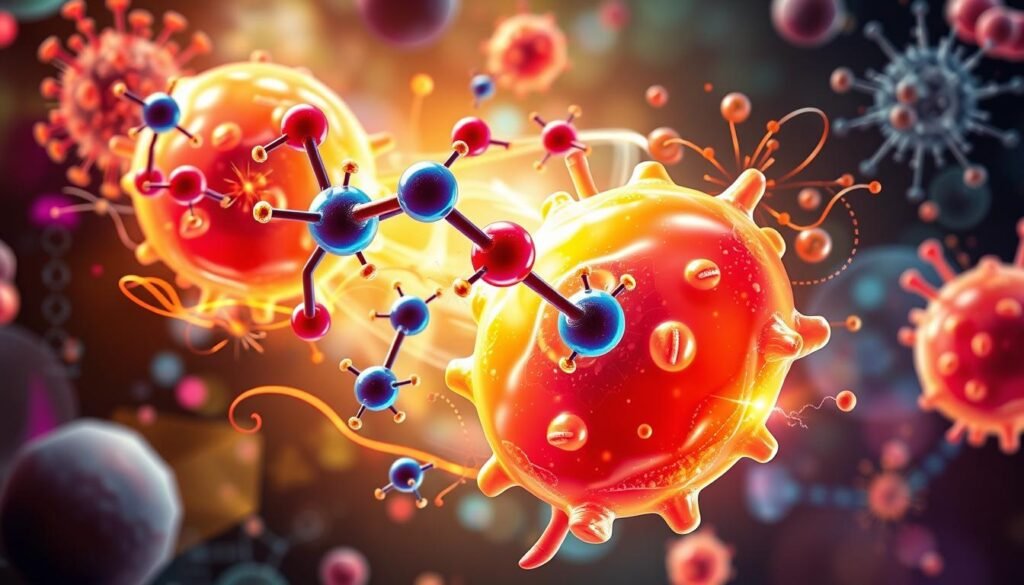L-Carnitine is great for weight loss and more energy. It moves fats into cell parts for energy. Most of it is in muscles, but also in blood and organs1. There are various L-Carnitine benefits, as it cuts fat but not muscle. It makes you energetic, perfect for active life. Studies show it really lowers weight and fat1. People eat 24 to 145 mg of it daily. Vegans get about 1.2 mg2.
Key Takeaways
- L-Carnitine transports fatty acids into mitochondria, aiding in fat metabolism.
- Reduces fat mass without affecting muscle mass.
- Significantly boosts energy levels.
- 95% of L-Carnitine is stored in muscles, aiding exercise performance.
- A 2020 review showed notable reductions in body weight, BMI, and fat mass with L-Carnitine supplementation.
What is L-Carnitine?
L-Carnitine is made in our body from two amino acids called lysine and methionine. It also needs vitamin C to form. You can find this compound mainly in our muscles and foods like meat and dairy.
L-Carnitine is key for energy production. It moves long-chain fatty acids into cell parts called mitochondria. There, they are turned into energy. This process is crucial for healthy L-Carnitine metabolism2.
Some people might not make enough L-Carnitine. This happens because of their genes or their food choices, like in vegetarians. For them, taking an L-Carnitine supplement can be helpful. Studies show that our bodies absorb 57% to 84% of L-Carnitine from food but only 14% to 18% from supplements1.
People who eat all types of food get about 24 to 145 mg of carnitine a day if they weigh 165 pounds. But, vegans get much less, only about 1.2 mg a day2. So, some might need supplements to get the right amount of L-Carnitine.
Over 95% of L-Carnitine in our body is in our muscles. Small amounts are also in the blood, liver, heart, and kidneys1. Even though we can make carnitine, eating foods with carnitine is still important. This is especially true for babies born early and people with certain kidney problems. They may need extra carnitine to stay healthy2.
Taking an L-Carnitine supplement might boost your energy, help with weight management, and support L-Carnitine metabolism. But, always talk to a doctor before starting new supplements. For more info, check educational resources. But remember to get advice from your doctor here.
How L-Carnitine Aids in Fat Burning
L-Carnitine is key in helping you lose weight by improving how you burn fat. It carries fats into mitochondria where they are turned into energy. This cuts down on fat storage, which helps with weight loss and boosts energy.

The Role of L-Carnitine in Fat Metabolism
L-Carnitine makes sure fats get into mitochondria, the parts of cells that make energy. This is super important for staying at a healthy weight and feeling energetic3. People get 1–3 grams of L-Carnitine from eating foods like meat, fish, and dairy each day4. But those who don’t eat much meat might need supplements3.
Studies show taking extra L-Carnitine can help you exercise better and longer. This can help you lose weight by letting you work out harder3. Looking at research, adding L-Carnitine to carbs increases muscle carnitine after 12 and 24 weeks5.
Scientific Studies on L-Carnitine and Weight Loss
Research shows L-Carnitine supplements can really help with weight loss. A big study in 2020 looked at 37 smaller studies. It found that L-Carnitine made people lose more weight and lower their BMI. People who were a bit overweight burned more fat and lost more weight than those who didn’t take it3. On average, they lost 1.3 kilograms more than those not taking the supplement4.
These studies used 1g to 4.5g of L-Carnitine a day, for 12 or 24 weeks5. Muscle carnitine stayed the same after 12 weeks. But after 12 and 24 weeks with carbs, it went up significantly5. This shows L-Carnitine is good at boosting fat burning and helping with weight loss during hard workouts.
Exploring the L-Carnitine Benefits
L-Carnitine has many benefits to enhance your health. It’s great for increasing energy, which is a big plus for fitness fans.
Increased Energy Production
L-Carnitine moves fatty acids into the mitochondria to burn for energy. This boosts fat burning and energy, making workouts better. Taking 2 grams of acetyl-L-carnitine for 50 days raises energy by 43%6.
Improved Exercise Performance
L-Carnitine helps stop too much lactic acid from forming. This means less fatigue and more intense workouts for longer. Studies show taking 2-4 grams each day can make you perform better in sports7. Also, taking it before exercising helps a lot with energy and feeling less tired7.
Protection Against Muscle Damage
L-Carnitine also protects muscles during hard workouts. It speeds up recovery, letting you exercise again sooner. Taking 1.5-3 grams after working out helps a lot with lessening muscle pain7.
It also fights oxidative stress, keeping muscles safe during tough training.
Check out Science-backed insights to learn more about L-Carnitine. It’s key for top health and best performance.
Other Health Benefits of L-Carnitine
L-Carnitine is super helpful for more than just losing weight and healing muscles. It can boost your health in many ways. From making your heart stronger, sharpening your mind, to helping with diabetes, L-Carnitine is key for good health.
Heart Health and Cholesterol Management
L-Carnitine is great for your heart. Research suggests it lowers blood pressure and cholesterol. This is super important for stopping heart disease. L-Carnitine has been studied in heart conditions like chest pain, heart attacks, and heart failure. Yet, findings vary8.
It also helps people move better who have poor blood flow in their legs, a condition known as intermittent claudication8.

Cognitive Function and Brain Health
L-Carnitine is awesome for your brain. Studies show it can lower dementia risk and make thinking clearer for older adults. A special type, Acetyl-L-carnitine, has been reviewed for various mental health conditions. This includes ADHD and Alzheimer’s disease9.
It even helps ease pain in Peyronie’s disease and boosts men’s sexual health8.
Management of Type 2 Diabetes
Recently, L-Carnitine has been studied for its help with diabetes. It can make your body better at using insulin and controlling sugar levels. There’s hope it can treat diabetic nerve damage, but more research is needed9.
A 1984 study found it can improve blood fats in diabetics, which is crucial9. If you want to know more about L-Carnitine’s benefits, check out this detailed study8.
Conclusion
L-Carnitine helps with weight loss and makes your mind sharper. It moves fatty acids to the mitochondria. This makes energy and helps lose weight. It also boosts how well you do sports. Plus, it’s good for your heart, helps men be more fertile, and helps muscles recover after sports.
Chronic heart disease is a big problem worldwide. L-Carnitine can help lower the risk. It’s linked to about 17.5 million deaths every year worldwide10. Studies show L-Carnitine can lower bad fat levels and raise good cholesterol. This is good for your heart. It’s especially helpful for people with bad cholesterol levels.
If you want to use L-Carnitine, the amount you take depends on what you need it for. For losing weight, 1-3 grams a day with exercise is best11. Athletes might need 2-4 grams a day for better performance and recovery11. Always talk to a doctor before starting L-Carnitine, especially if you already take other medicines.
L-Carnitine does more than just help you lose weight and feel energetic. It can save lives for people with a special health condition called PCD12. By taking it, you can stay healthier, physically and mentally. If you want to learn more, check out this guide12 or get more info from health fitness science11.
Source Links
- L-Carnitine: Benefits, Side Effects, Sources, and Dosage – https://www.healthline.com/nutrition/l-carnitine
- Office of Dietary Supplements – Carnitine – https://ods.od.nih.gov/factsheets/Carnitine-HealthProfessional/
- L-Carnitine: Unveiling the Science Behind its Role in Effective Weight Loss | Aesthetics 360 Lash & MedSpa – https://aesthetics360medspa.com/weight-loss/l-carnitine-unveiling-the-science-behind-its-role-in-effective-weight-loss/
- L-Carnitine: Types, benefits, and side effects – https://www.medicalnewstoday.com/articles/l-carnitine
- The bright and the dark sides of L-carnitine supplementation: a systematic review – Journal of the International Society of Sports Nutrition – https://jissn.biomedcentral.com/articles/10.1186/s12970-020-00377-2
- L-Carnitine – https://lpi.oregonstate.edu/mic/dietary-factors/L-carnitine
- The Complete Guide to L Carnitine Uses and Dosage – https://www.sova.health/blogs/expert-advice/the-ultimate-guide-to-l-carnitine-uses-and-dosage?srsltid=AfmBOorXOMwl0IbbPFZX-V-OqzQFfJ4pjPv4d8ISOmP483Puj5Fzok7-
- Carnitine (L-carnitine) Information | Mount Sinai – https://www.mountsinai.org/health-library/supplement/carnitine-l-carnitine
- L-CARNITINE: Overview, Uses, Side Effects, Precautions, Interactions, Dosing and Reviews – https://www.webmd.com/vitamins/ai/ingredientmono-1026/l-carnitine
- Frontiers | The effect of L-carnitine supplementation on lipid profile in adults: an umbrella meta-analysis on interventional meta-analyses – https://www.frontiersin.org/journals/nutrition/articles/10.3389/fnut.2023.1214734/full
- The Complete Guide to L Carnitine Uses and Dosage – https://www.sova.health/blogs/expert-advice/the-ultimate-guide-to-l-carnitine-uses-and-dosage?srsltid=AfmBOoon7UxFOxUQ-urAjIpgoKTfcEuhHTB-U_2bDe3C9N8Xr6e8UhlD
- l-carnitine: Nutrition, pathology, and health benefits – https://pmc.ncbi.nlm.nih.gov/articles/PMC9827390/
